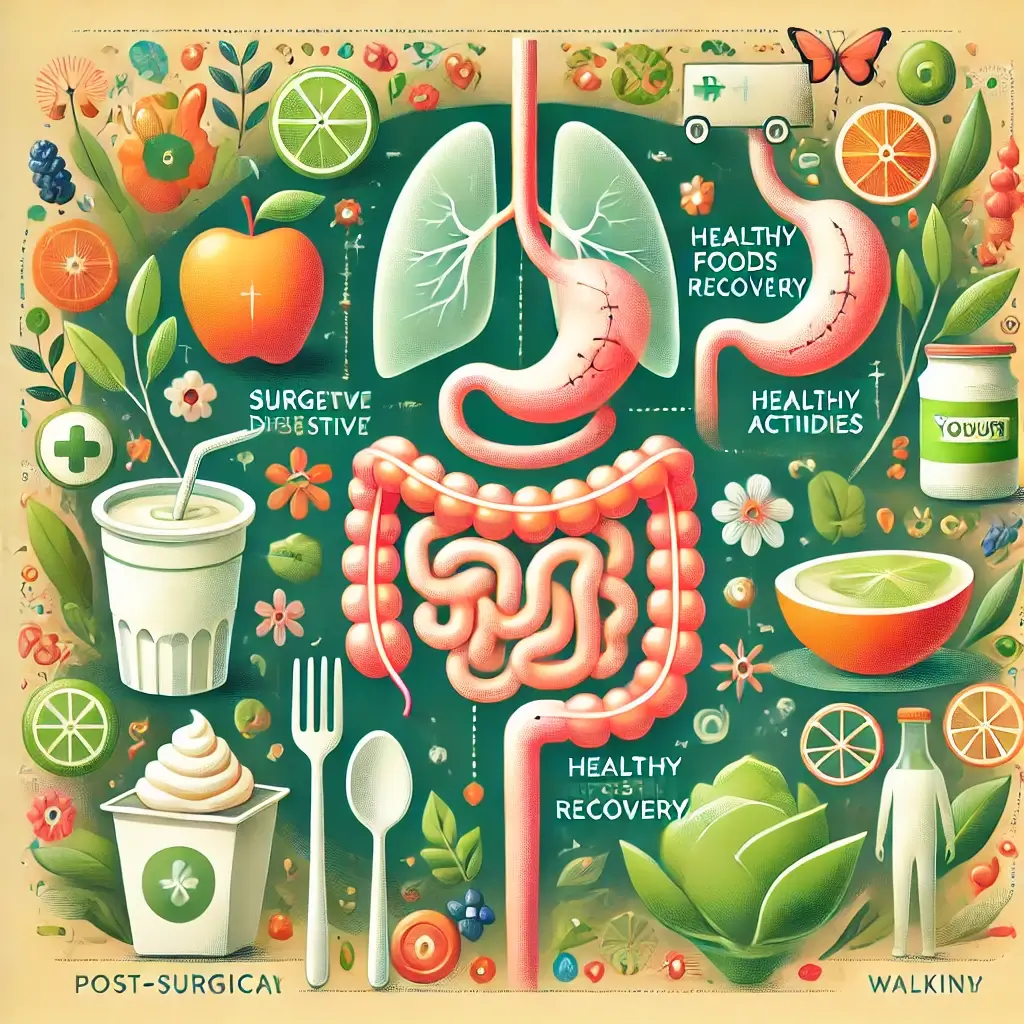Introduction to Post-Surgical Recovery
Surgery is often a necessary intervention for addressing health issues, whether to treat a condition or improve quality of life. However, it can significantly impact various bodily systems, particularly the digestive system. Patients frequently face challenges such as constipation, nausea, bloating, and diarrhea due to anesthesia effects on digestive system, dietary changes, and medications. Despite these challenges, a proactive approach to digestive health can make recovery smoother and more comfortable.
The digestive system is deeply connected to overall health, including immunity and mental well-being. post-surgical digestive issues can lead to discomfort, slow healing, and even complications if not addressed. This guide provides a comprehensive look at why these issues occur and how to manage them effectively. Drawing from recent medical research, we will explore evidence-based strategies to restore gut microbiome and improve digestive function after surgery.
Understanding Post-Surgical Digestive Challenges
Anesthesia is indispensable for modern surgical procedures, but its effects on the digestive system are significant. It can slow gut motility, causing postoperative ileus symptoms, a temporary condition where the intestines do not function properly. A 2017 study published in Anesthesia & Analgesia investigated the effects of various anesthetic agents on gastrointestinal motility. The study found that all types of anesthesia reduce gut movement temporarily, contributing to symptoms like bloating and constipation. This highlights the importance of resuming activity and implementing strategies to stimulate the gut as part of post-surgical care.
Impact of Dietary Changes
After surgery, patients often transition to a liquid or soft-food diet, which can disrupt the gut microbiome. The gut microbiome comprises trillions of microorganisms that play a key role in digestion, immune function, and even mental health. A 2018 review in Nutrients examined how dietary changes affect gut bacteria composition. The review emphasized that the lack of dietary fiber and variety during recovery can reduce the diversity of gut bacteria, potentially leading to digestive discomfort.
Effects of Antibiotics
Antibiotics, commonly prescribed after surgery to prevent infection, can have unintended consequences for gut health. A 2015 study in Clinical Gastroenterology and Hepatology explored the impact of antibiotics on gut bacteria. The researchers observed a significant decrease in microbial diversity, which is essential for maintaining gut health. This imbalance often manifests as gas, bloating, and irregular bowel movements.
Strategies for Digestive Recovery
Taking an active role in managing digestive health after surgery is essential. Here are research-backed strategies for ensuring a smoother recovery:
1. Gradually Reintroduce a Regular Diet
Transitioning back to solid foods should be done carefully and under a doctor’s supervision. Begin with easily digestible foods for post-surgery recovery like broths and mashed vegetables before incorporating fiber-rich items such as whole grains and fruits. This gradual approach minimizes stress on the digestive system.
2. Prioritize Hydration
Dehydration is a common cause of constipation after surgery. Drinking adequate amounts of water and including electrolyte-rich fluids can support bowel movements and overall recovery.
3. Incorporate Fiber
Once permitted by your healthcare provider, introduce high-fiber foods for digestive health such as beans, berries, and leafy greens. A balanced intake of fiber helps regulate bowel movements and fosters a healthy gut microbiome.
4. Consider Probiotics
Probiotics can help replenish beneficial bacteria in the gut. A systematic review in Frontiers in Medicine (2019) concluded that probiotics improve post-surgical gut health and may alleviate post-surgical digestive symptoms. However, always consult with your doctor before starting any supplements.
Restoring Microbiome Balance
The gut microbiome plays a vital role in overall health, particularly in the aftermath of surgery. Here are additional steps to support microbial diversity and balance:
Fermented Foods: Foods like yogurt, kimchi, and sauerkraut are rich in probiotics, which replenish beneficial bacteria. Ensure these align with dietary recommendations provided by your doctor.
Prebiotics: prebiotic-rich foods for gut health like onions, garlic, and asparagus into your meals as tolerated.
Stress Management: High stress levels negatively impact gut health. Practices such as meditation and deep breathing exercises can improve digestion and mental well-being during recovery.
Conclusion
A successful recovery from surgery involves more than wound healing—it requires attention to the digestive system. By understanding the common post-surgical challenges and taking steps to manage them, patients can support their gut health and overall healing process. Incorporating strategies like gradual diet reintroduction after surgery, staying hydrated, and supporting the gut microbiome can significantly enhance comfort and recovery outcomes. Always consult with your healthcare provider for personalized guidance and seek immediate medical advice if digestive issues persist or worsen.
References
Buettner, C., Ueberle, B., Faßbender, K., & Kuntz-Löffler, U. (2017). Influence of volatile anaesthetics on gastrointestinal motility. Anesthesia & Analgesia, 124(5), 1321–1332.
Guarner, F., Rinninella, M., Moreno, F. J., Maggi, L., Manichanh, C., & Loftus, S. (2018). Dietary intervention with prebiotics and synbiotics in gut microbiota. Nutrients.
Taur, Y., & Pamer, E. G. (2015). The intestinal microbiota and susceptibility to infection in immunocompromised patients. Clinical Gastroenterology and Hepatology, 13(10), 943–954.
Ouwehand, A. C., Salminen, S., & Isolauri, E. (2002). Probiotic and other functional microbes: From markets to mechanisms. Frontiers in Medicine.
